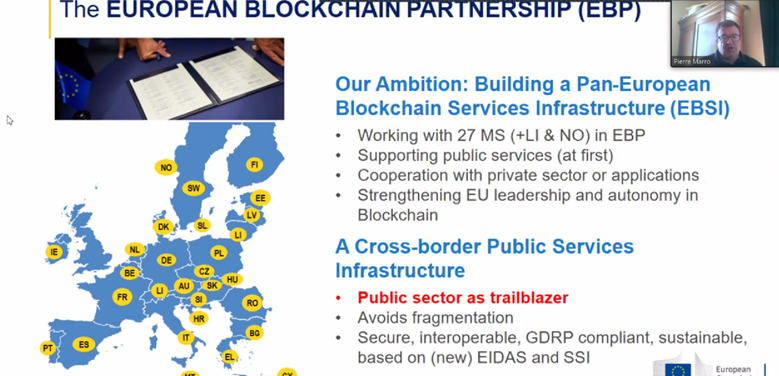How Blockchain is Making Life Easier for Citizens and Companies
On March 31, Infrachain organized a special “Blockchain in the Public Sector” webinar for its community members, where they discovered the blockchain initiative of the Ministry for Digitalisation of Luxembourg and an exclusive presentation of The European Blockchain Services Infrastructure (EBSI).
The Prime Minister of Luxembourg Xavier Bettel said it himself: “A significant part of the activities of the Ministry for Digitalisation are aimed at making people’s lives easier.” With this in mind, the Ministry for Digitalisation set up a Public Sector Blockchain in 2019 together with SIGI and the governement’s IT centre CTIE. The objective is to make life easier for citizens and companies.
To better understand how the Luxembourg Public Sector Blockchain enables collaboration between the public sector and private bodies, the speakers from the Ministry for Digitalisation, Patrick Weber, Attaché, and Eric Weber, Project Manager, introduced the public sector blockchain (PSBC) initiative of the Ministry.
P. Weber opened the presentation with an introduction to the PSBC. The initiative consists of an Ethereum blockchain with smart contracts. The private sector is involved through running their own nodes. A dedicated governance was developed with the help of Infrachain.
He then presented the up and running use cases on Data Authenticity and Notarisation, involving digital signatures of data and documents recorded on the PSBC. “With this use cases, we have the opportunity to increase trust in official documents and data through independent verification of authenticity,” he explained, adding that “it also allows the authentication of third party documents by opening up the system to other partners, public or private.” He concluded the PSBC presentation by mentioning the collaboration with Private Banks thorugh loan approval smart contracts.
For the second part of the webinar, Pierre Marro, Administrator for Digital Innovation and Blockchain at the European Commission’s DG CONNECT, shared an exclusive presentation of the European Blockchain Services Infrastructure (EBSI) and its technical set-up and use cases.
Dedicated to releasing the potential of blockchain-based services for the benefit of citizens, society and the economy, EBSI is deploying a network of distributed blockchain nodes across Europe, supporting applications focused on selected use-cases.
“EBSI is the first EU-wide blockchain public driven infrastructure and aims to be a market-friendly ecosystem based on open standards,” explained Marro. He then shared in-depth explanations on the EBSI Architecture which is being built today alongside a fully distributed three-tier architecture and which is extending the typical Enterprise Architecture stack with the core services layer.
“The need for trust, for guaranteeing and verifying the authenticity of information is everywhere,” said Marro while presenting a list of multiple affected sectors, notably the Education sector as EBSI is running a use case on guarantying and verifying the origin of diploma credentials. Marro revealed that, “EBSI supports the creation of first cross-border services such as for citizens to manage their own identity and educational credentials as well as to notarise documents.”
His presentation ended with information on EBSI evolution and related actions, as well as a call to action to collaborate with member states (and their partners) who want to implement the use case(s) as early adopters at the beginning of 2021.
To conclude the webinar, E. Weber introduced the EBSILUX project. The main objective is to contribute to the completion and functioning of the internal market in support of the competitiveness of the European economy by integrating Luxembourg into the European Blockchain Service Infrastructure (EBSI) and implementing a European EBSI use case at national level. EBSILUX has been implementing the diplomas use case in Luxembourg since the beginning of 2021. “EBSI gives students better control over their identity and education credentials”, E. Weber revealed. This strengthens students’ confidence ”that their credentials are secured and won’t be subject to suspicion.”
The webinar was part of a series of events only open to Infrachain members. Interested companies that which to join Infrachain can contact the team or directly submit their adherence request online.


